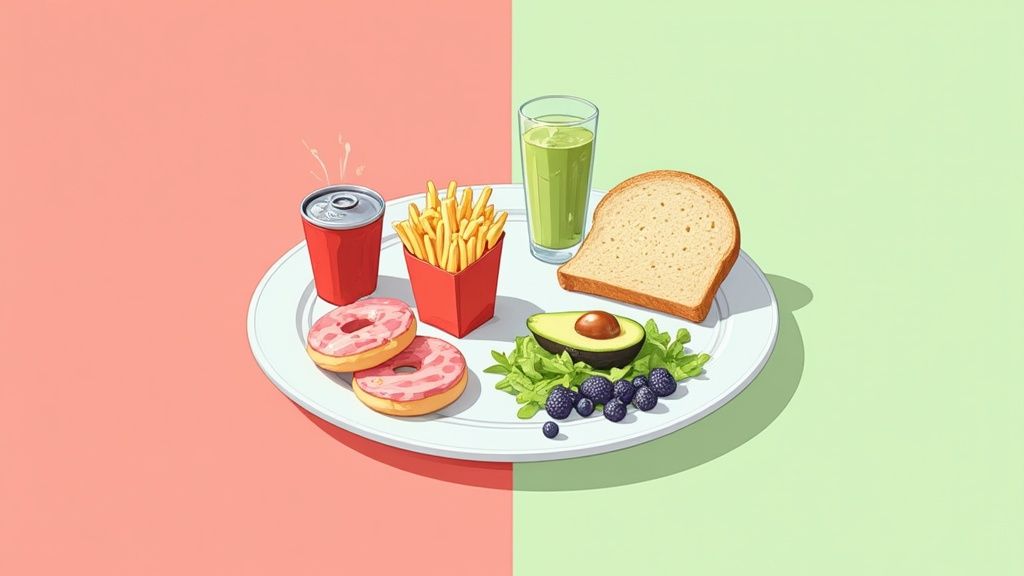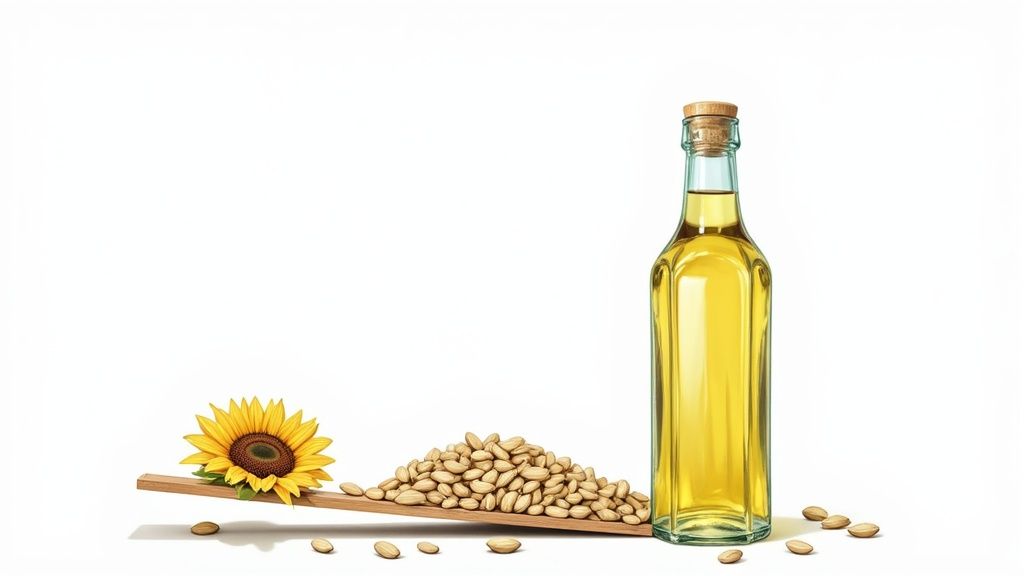What Foods Cause Inflammation? Find Out & Avoid Them

Chronic inflammation is a silent contributor to many modern health issues, from joint pain and fatigue to more serious conditions. While factors like stress and lack of sleep play a role, your diet is one of the most powerful levers you can pull to manage it. But it's not always obvious what foods cause inflammation, as many seemingly harmless ingredients in everyday meals can trigger your body's inflammatory response, preventing you from feeling your best. This is especially true for those trying to reduce sugar, manage energy crashes, or make sustainable lifestyle changes.
This guide uncovers the 8 most common food groups that fuel inflammation, from refined sugars to certain processed oils. We will move beyond generic advice to provide clear, actionable insights. For each item on the list, we’ll dive into the science behind why it causes problems, identify specific products where it lurks, and offer simple, practical swaps. Our goal is to help you build an anti-inflammatory plate without feeling deprived. Understanding these hidden culprits is the first, most crucial step toward reclaiming your energy, improving your mood, and supporting your long-term health. Let's get started.
1. Refined Sugar and High-Fructose Corn Syrup
When people ask, "what foods cause inflammation?" refined sugar and its close relative, high-fructose corn syrup (HFCS), are often at the top of the list. When you consume these sweeteners, your body experiences a rapid spike in blood glucose. This triggers a rush of insulin to manage the sugar, but it also prompts the release of inflammatory messengers called cytokines. Over time, this cycle can lead to chronic, low-grade inflammation that affects your entire system.

Where Sugar Hides
The biggest challenge with sugar is that it’s not just in obvious places like candy and soda. It's hidden in countless processed foods, making it easy to consume far more than you realize.
- Sweetened Beverages: Sodas, fruit juices, energy drinks, and sweetened coffees.
- Baked Goods & Desserts: Cookies, cakes, pastries, and ice cream.
- Breakfast Foods: Many breakfast cereals, granola bars, and flavored yogurts.
- Savory Surprises: Condiments like ketchup, barbecue sauce, salad dressings, and even bread.
Actionable Tips to Reduce Sugar
Cutting back on sugar doesn’t have to feel like a punishment. It's about making smart, gradual swaps to retrain your palate and reduce inflammation.
- Read Labels Carefully: Look for added sugars like sucrose, dextrose, corn syrup, and maltose in ingredient lists.
- Swap Your Drinks: Replace sugary sodas and juices with sparkling water, herbal tea, or water infused with fruit.
- Choose Whole Foods: Opt for a whole apple instead of apple juice. The fiber in the fruit helps slow down sugar absorption.
- Cook at Home: Preparing your own meals gives you complete control over the ingredients, allowing you to reduce or eliminate added sugars.
Making these small changes can significantly lower your sugar intake and help manage inflammation. If you're looking for a structured approach, you can learn more about how to cut down on sugar with a step-by-step guide.
2. Refined Sugar and High-Fructose Corn Syrup
When people ask, "what foods cause inflammation?" refined sugar and its close relative, high-fructose corn syrup (HFCS), are often at the top of the list. When you consume these sweeteners, your body experiences a rapid spike in blood glucose. This triggers a rush of insulin to manage the sugar, but it also prompts the release of inflammatory messengers called cytokines. Over time, this cycle can lead to chronic, low-grade inflammation that affects your entire system.

Where Sugar Hides
The biggest challenge with sugar is that it’s not just in obvious places like candy and soda. It's hidden in countless processed foods, making it easy to consume far more than you realize and unknowingly fuel inflammation.
- Sweetened Beverages: Sodas, energy drinks, fruit juices, and sweetened coffees.
- Baked Goods & Desserts: Cookies, cakes, pastries, and ice cream.
- Breakfast Foods: Many breakfast cereals, granola bars, and flavored yogurts.
- Savory Surprises: Condiments like ketchup, barbecue sauce, salad dressings, and even bread.
Actionable Tips to Reduce Sugar
Cutting back on sugar doesn’t have to feel like a punishment. It's about making smart, gradual swaps to retrain your palate and reduce inflammation. These small changes can make a big difference in how you feel.
- Read Labels Carefully: Look for added sugars like sucrose, dextrose, corn syrup, and maltose in ingredient lists.
- Swap Your Drinks: Replace sugary sodas and juices with sparkling water, herbal tea, or water infused with fruit.
- Choose Whole Foods: Opt for a whole apple instead of apple juice. The fiber in the fruit helps slow down sugar absorption.
- Cook at Home: Preparing your own meals gives you complete control over the ingredients, allowing you to reduce or eliminate added sugars.
Making these small changes can significantly lower your sugar intake and help manage inflammation. If you're looking for a structured approach, you can learn more about how to cut down on sugar with a step-by-step guide.
3. Trans Fats and Partially Hydrogenated Oils
When exploring what foods cause inflammation, artificial trans fats are among the most harmful culprits. Created through a process called partial hydrogenation, these fats make liquid vegetable oils solid at room temperature, extending shelf life. However, they are highly inflammatory because they damage the lining of your blood vessels, alter cell membrane structure, and trigger the body's inflammatory response.

Where Trans Fats Hide
While many countries have banned or restricted their use, trans fats can still be found in various processed and commercially prepared foods. They are often used to improve texture and prevent spoilage, making them a common ingredient in convenience items.
- Fried & Fast Foods: French fries, fried chicken, and doughnuts are often cooked in partially hydrogenated oils.
- Commercial Baked Goods: Packaged cakes, cookies, pies, and pastries frequently contain these fats for a longer shelf life.
- Margarine & Shortening: Many stick margarines and vegetable shortenings are prime sources of trans fats.
- Packaged Snacks: Microwave popcorn, some crackers, and frozen pizzas can contain hidden trans fats.
Actionable Tips to Avoid Trans Fats
Eliminating artificial trans fats is a powerful step toward reducing chronic inflammation. This involves becoming a diligent label-reader and making conscious choices about the foods you buy and eat.
- Scan Ingredient Lists: Always check labels for "partially hydrogenated oils." This is the key indicator of artificial trans fats, even if the label claims "0g trans fat."
- Choose Healthier Fats: Opt for natural fats like butter, olive oil, coconut oil, or avocado oil instead of margarine or shortening.
- Limit Fried Foods: Reduce your intake of deep-fried items, especially from fast-food restaurants, as the oil used is often a source of trans fats.
- Bake at Home: Preparing your own baked goods gives you full control over the ingredients, allowing you to use healthier fats and avoid preservatives.
4. Refined Grains and White Flour Products
Similar to refined sugar, refined grains are a common answer when asking "what foods cause inflammation?". These grains have been heavily processed, stripping away their bran and germ. This process removes most of the fiber, vitamins, and minerals, leaving behind a starchy endosperm that your body digests very quickly. This rapid conversion to sugar triggers a similar inflammatory response, causing blood sugar spikes and promoting the release of pro-inflammatory cytokines.

Where Refined Grains Hide
Refined carbohydrates are staples in many diets, often appearing in foods we consume daily without a second thought. Their versatility makes them a common ingredient in both sweet and savory products.
- Breads and Pastas: White bread, bagels, dinner rolls, and most white pasta.
- Snack Foods: Crackers, pretzels, rice cakes, and many granola bars.
- Breakfast Items: Most commercial breakfast cereals, pastries, and pancakes.
- Core Ingredients: White rice and instant noodles.
Actionable Tips to Reduce Refined Grains
Swapping out refined grains for their whole, unprocessed counterparts is a powerful way to reduce inflammation. These tips will help you make the switch smoothly.
- Read Labels: Look for the words "100% whole grain" or "100% whole wheat" as the first ingredient.
- Swap Your Staples: Replace white rice with brown rice, quinoa, or farro. Choose whole-wheat pasta and bread instead of the white flour versions.
- Try Ancient Grains: Experiment with nutritious and flavorful ancient grains like spelt, amaranth, or teff in your cooking and baking.
- Balance Your Plate: When you do eat refined grains, combine them with protein and healthy fats to slow down their absorption and reduce the blood sugar spike.
5. Vegetable Oils High in Omega-6 Fatty Acids
When considering what foods cause inflammation, many common cooking oils are significant culprits. Vegetable oils like soybean, corn, and sunflower oil are loaded with omega-6 fatty acids. While our bodies need omega-6s, the issue is one of balance. The modern diet has skewed the ratio of omega-6 to omega-3 fatty acids to as high as 20:1, far from the ideal 4:1. This imbalance promotes the production of pro-inflammatory compounds in the body, contributing to chronic inflammation.
Where These Oils Are Found
Like hidden sugars, these omega-6-rich oils are pervasive in the modern food supply, particularly in processed and restaurant foods. Their low cost and neutral flavor make them a go-to for food manufacturers.
- Processed Foods: Soybean oil is a primary ingredient in countless packaged goods, from crackers and chips to frozen meals.
- Cooking Oils: Corn, sunflower, safflower, and cottonseed oils are common household cooking oils.
- Condiments & Dressings: Most store-bought salad dressings, mayonnaise, and creamy sauces use these oils as a base.
- Fried Foods: Restaurants and fast-food chains almost exclusively use high-omega-6 vegetable oils for deep frying.
Actionable Tips to Balance Your Fats
Restoring a healthier fatty acid balance is a powerful way to combat inflammation. This involves decreasing your intake of high-omega-6 oils while increasing anti-inflammatory omega-3s.
- Upgrade Your Cooking Oil: Switch to oils high in monounsaturated fats or beneficial omega-3s, such as extra virgin olive oil, avocado oil, or coconut oil for cooking.
- Read Ingredient Labels: Actively avoid products listing soybean, corn, cottonseed, or sunflower oil high on the ingredient list.
- Make Dressings at Home: Create simple, healthy salad dressings using a base of olive oil, lemon juice, and herbs.
- Boost Omega-3s: Increase your intake of fatty fish like salmon, along with flax seeds and walnuts, to help counteract the inflammatory effects of omega-6s.
Making these changes can be straightforward, even for busy individuals. You can explore more strategies in these healthy eating tips for busy professionals.
6. Dairy Products (For Some Individuals)
Dairy is a complex category when discussing "what foods cause inflammation," as its effects are highly individual. For many, dairy is a source of calcium and protein, but for a significant portion of the population, it can be a major inflammatory trigger. This reaction often stems from lactose intolerance, an allergy to milk proteins like casein and whey, or a more subtle sensitivity.
Even for those without a diagnosed condition, conventional dairy products can contain hormones and saturated fats that may contribute to low-grade inflammation. The body's immune system may react to these components as foreign invaders, initiating an inflammatory response that can manifest as digestive distress, skin issues, or joint pain.
Common Dairy Triggers
Inflammatory responses can be triggered by a wide range of common dairy products, many of which are staples in the Western diet.
- Liquid Dairy: Milk, cream, and buttermilk.
- Cultured & Soft Dairy: Yogurt, cheese (especially soft cheeses like cottage and cream cheese), and sour cream.
- Frozen & Concentrated Dairy: Ice cream, dairy-based desserts, and protein powders made from whey or casein.
- Fats: Butter is often a hidden component in many cooked dishes and baked goods.
Actionable Tips to Manage Dairy Intake
If you suspect dairy is contributing to your inflammation, you can take practical steps to identify the issue and find suitable alternatives.
- Try an Elimination Diet: Remove all dairy from your diet for 2-4 weeks and monitor your symptoms. Reintroduce it slowly to see if symptoms return.
- Choose Higher-Quality Dairy: If you tolerate dairy, opt for organic, grass-fed products, which have a better fatty acid profile. Some people also find A2 milk or fermented options like kefir easier to digest.
- Explore Plant-Based Alternatives: Swap cow's milk for almond, oat, coconut, or soy milk. There are now excellent plant-based alternatives for cheese, yogurt, and ice cream.
- Monitor Your Body's Signals: Pay close attention to symptoms like bloating, gas, acne, eczema, or joint stiffness after consuming dairy. This is your body's way of communicating a potential issue.
7. Processed and Ultra-Processed Foods
When considering what foods cause inflammation, ultra-processed foods are a major contributor. These items undergo extensive industrial processing and are packed with additives, preservatives, artificial flavors, and colors. This process often strips them of beneficial nutrients like fiber and antioxidants while loading them with inflammatory ingredients such as refined sugars, unhealthy fats, and excessive sodium. This combination directly fuels the body's inflammatory response, contributing to chronic health issues.
Where Processed Foods are Found
Like sugar, processed ingredients are pervasive in the modern diet, often marketed as convenient solutions for busy lifestyles. They are designed to be hyper-palatable, making them easy to overconsume.
- Packaged Snacks: Potato chips, crackers, pretzels, and many granola bars.
- Convenience Meals: Frozen dinners, canned soups, and instant noodles.
- Processed Meats: Hot dogs, deli meats, sausages, and chicken nuggets.
- Fast Food: Burgers, fries, and other items from chain restaurants are prime examples of ultra-processed meals.
Actionable Tips to Reduce Processed Foods
Shifting away from processed foods involves building new habits around whole-food preparation. It’s about prioritizing fresh ingredients and regaining control over what goes into your meals.
- Shop the Perimeter: The outer aisles of the grocery store are typically where you'll find whole foods like fresh produce, meats, and dairy.
- Read the Ingredient List: A good rule of thumb is to be wary of products with long lists of ingredients you can't pronounce.
- Embrace Meal Prep: Dedicate time each week to prepare meals and snacks from scratch. This makes it easier to avoid convenience foods when you're busy.
- Cook at Home: The more you cook, the less you rely on processed options. Start with simple recipes and gradually build your skills.
Making this change is a powerful step toward a less inflammatory diet. If you need support, you can discover practical strategies on how to break bad eating habits and build a healthier lifestyle.
8. Alcohol (Excessive Consumption)
While a single glass of wine might not seem like a problem, excessive alcohol consumption is a major contributor when considering what foods cause inflammation. When you drink alcohol, your body metabolizes it into acetaldehyde, a toxic compound. This substance directly damages your cells and tissues, particularly in the gut and liver, triggering a significant inflammatory response as your body works to clear the toxin.
This process can disrupt the delicate balance of bacteria in your gut, leading to a condition known as "leaky gut," where toxins and bacteria can pass into your bloodstream and cause system-wide inflammation. Chronic heavy drinking puts immense stress on the liver, which can lead to chronic liver inflammation, fatty liver disease, and other serious health issues over time.
Where Excessive Alcohol is a Problem
Inflammation from alcohol isn't just about one type of drink; it's about the quantity and frequency of consumption. The more you drink, the greater the inflammatory burden on your body.
- Binge Drinking Episodes: Consuming large amounts of alcohol in a short period overwhelms your body's ability to process it.
- Daily Heavy Drinking: Regular, excessive consumption keeps your body in a constant state of inflammation.
- Sugary Cocktails & Mixers: Mixed drinks often combine alcohol with high-fructose corn syrup or refined sugar, delivering a double blow of inflammatory ingredients.
- Beer, Wine, and Spirits: Any type of alcohol, when consumed in excess, will trigger this inflammatory cascade.
Actionable Tips to Reduce Alcohol's Impact
Moderating your alcohol intake is a powerful way to lower inflammation and support your overall health. It's about being mindful of how much and how often you drink.
- Stick to Moderate Amounts: The general guideline is no more than one drink per day for women and up to two drinks per day for men.
- Choose Red Wine: If you choose to drink, red wine contains antioxidants like resveratrol, which may offer some anti-inflammatory benefits in moderation.
- Avoid Sugary Mixers: Opt for soda water, a splash of lime, or other non-sugary mixers instead of juice, soda, or pre-made cocktail mixes.
- Incorporate Alcohol-Free Days: Designate several days each week where you don’t drink at all to give your liver and gut a rest.
- Stay Hydrated: Drink a glass of water for every alcoholic beverage you consume to help your body process the alcohol and stay hydrated.
Inflammation Potential of 8 Common Foods
| Item | 🔄 Implementation Complexity | ⚡ Resource Requirements | 📊 Expected Outcomes | 💡 Ideal Use Cases | ⭐ Key Advantages |
|---|---|---|---|---|---|
| Processed and Red Meats | Moderate (choosing and limiting intake) | Moderate (selecting quality meat, cooking) | Increases inflammation, oxidative stress, disease risk | Reducing intake for chronic disease prevention | Rich in protein; can choose better-quality options |
| Refined Sugar & High-Fructose Corn Syrup | Low (reduce consumption, label reading) | Low (substitutes readily available) | Rapid blood sugar spikes, insulin resistance, inflammation | Gradual sugar reduction and metabolic health improvement | Sweetness power; natural substitutes available |
| Trans Fats & Partially Hydrogenated Oils | Moderate (label vigilance, cooking changes) | Low to Moderate (finding alternatives) | Strong inflammation, higher cardiovascular risk | Avoidance due to strong health risks | Extended shelf life in food manufacturing |
| Refined Grains & White Flour Products | Moderate (substitution and gradual transition) | Moderate (whole grain alternatives) | Blood sugar spikes, inflammation, insulin resistance | Replace with whole grains for metabolic and gut health | Widely available, long shelf life |
| Vegetable Oils High in Omega-6 | Moderate (substitute oils, cooking adjustments) | Moderate (purchase of alternatives) | Promotes inflammation via fatty acid imbalance | Choosing healthier oils for cooking and dressings | Affordable, widely used cooking oils |
| Dairy Products (For Some Individuals) | Moderate (testing tolerance, substitution) | Moderate (alternative products may cost more) | Variable inflammation depending on sensitivity | Targeted elimination in sensitive individuals | Good nutrition; beneficial probiotics in fermented |
| Processed and Ultra-Processed Foods | Low to Moderate (label reading, meal prep) | Moderate (more fresh ingredients needed) | High chronic inflammation and disease risk | Minimizing processed food for overall health | Convenience and shelf stability |
| Alcohol (Excessive Consumption) | Moderate (monitoring intake, lifestyle changes) | Low (limiting quantity, better choices) | Liver inflammation, systemic inflammation, disease | Moderation to balance social and health benefits | Social and some cardiovascular benefits at moderate levels |
Your Action Plan for an Anti-Inflammatory Lifestyle
Navigating the world of nutrition can feel complex, but understanding what foods cause inflammation is a powerful first step toward taking control of your health. Throughout this guide, we've pinpointed specific culprits, from the trans fats lurking in processed snacks to the refined sugars in your favorite desserts and the inflammatory omega-6 fatty acids found in certain vegetable oils. The common thread is clear: modern, highly processed ingredients often trigger the body’s inflammatory response, which can lead to chronic health issues, low energy, and persistent discomfort.
The goal isn't to create a rigid list of "forbidden" foods or to demand perfection. Instead, view this as a guide for making mindful, incremental upgrades. The journey to an anti-inflammatory lifestyle is built on small, sustainable swaps that accumulate over time.
Putting Knowledge into Practice: Your Next Steps
Ready to move from learning to doing? Here’s a simple, actionable framework to get you started without feeling overwhelmed.
- Start with One Small Swap: Don't try to overhaul your entire diet overnight. This week, pick just one thing. If you regularly cook with soybean or corn oil, try switching to avocado or olive oil. If you enjoy a sugary soda every afternoon, replace it with a flavored sparkling water.
- Focus on Addition, Not Just Subtraction: Instead of only thinking about what to remove, focus on what you can add. Add a side of leafy greens to your dinner, snack on a handful of walnuts instead of chips, or incorporate fatty fish like salmon into your weekly meal plan. Crowding out inflammatory foods with nutrient-dense options makes the transition feel less restrictive.
- Read Labels Diligently: Become a food detective. Look for hidden sugars (like high-fructose corn syrup), trans fats (listed as "partially hydrogenated oils"), and long lists of artificial ingredients. The fewer ingredients on the label, the better.
The Bigger Picture: Long-Term Vitality
Mastering this knowledge is about more than just avoiding pain or bloating; it's about investing in your long-term vitality. Reducing your intake of foods that cause inflammation can lead to profound benefits, including more stable energy levels, improved mood, better joint health, and a reduced risk of chronic diseases. You are actively building a more resilient body and mind.
Key Takeaway: An anti-inflammatory diet is not a temporary fix. It is a sustainable approach to eating that nourishes your body at a cellular level, empowering you to feel your best day in and day out.
For those eager to continue exploring how dietary choices influence overall well-being, diving into different perspectives can be incredibly helpful. You can find additional insights on dietary wellness that cover a wide range of topics to support your health journey.
Ultimately, your plate is one of the most powerful tools you have. Each meal is an opportunity to reduce inflammation and build a foundation for a healthier, more vibrant future. Start small, stay consistent, and celebrate every positive choice you make along the way. Your body will thank you for it.